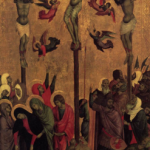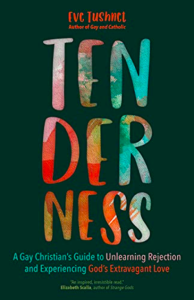I do think the Side A appeal to the text It is better to marry than to burn, (1) as a reason to accept gay marriage, has some teeth. I also think it’s not enough. And I think it fits into a broader framework, one that’s characteristic of American Christianity.
To explore this characteristic, I’d like to consider another text I’ve often heard cited as an argument against Side B: Ye shall know them by their fruits. The bad fruit so frequently (and with some reason) attributed to Side B beliefs—loneliness; self-hatred; impulsive, unsafe sexual behavior—are presented as evidence that Side B is a bad tree. And, as with better to marry, I don’t want to imply that that argument has no value. But I don’t think it’s what Christ was talking about.

The thing is, in both passages (from Matthew 7 and Luke 6) where this parable is used, the tree is not standing in for systems of teaching. It’s standing in for individual people. Matthew speaks specifically of false prophets, while Luke applies it to good and evil men generally, and it’s likely enough that our Lord used the same analogy more than once and in both contexts. The gist of the teaching is that you know a person’s character by their actions, not that you can judge a belief system by its adherents—which, if it were true, would be much more of a threat to Christianity in general than to Side B.
I think the application of the by their fruits rubric to belief systems is more than just the ordinary imprecision of the human mind, though. I think it reflects a typically American and quite false assumption: that the truth will make you successful.
Now, in the very last analysis, it will. The only success that will finally matter is success before the throne of God on the Last Day. But I know of no promise that we will experience earthly success or happiness by clinging to right doctrine or right practice; what we are promised are persecutions and temptations, and indeed a cross of our own. The martyrs received death: from an earthly standpoint, the worst possible fruit of a belief. We are not promised safety from heartbreak or suffering; worse still, we are promised grace to endure them. We are not told that ordinary earthly happiness and security will be ours—on any terms.

And I think that applies here. It is indeed better to marry than to burn; but it just doesn’t follow that everyone can marry, or that no one has to bear the cross of simply burning. To burn is an exceptional cross. Some crosses are. But we have to expect that sometimes. There’s no good trying to reshape our theology to avoid either this problem or some other just like it. Nothing is going to fully heal these burns except a new universe; we’re promised that, too.
(1) For those who haven’t read the preceding posts, the word burn here (and throughout) indicates burning with desire or passion. It has absolutely no connection to hell, or even to purgatory.
Images via Pixabay
















